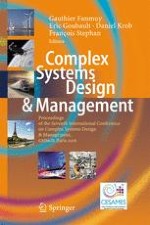2017 | OriginalPaper | Buchkapitel
System Engineering Education for Confirmed Engineers: The FAIS case Study- A 6 years Feedback
verfasst von : Omar Hammami
Erschienen in: Complex Systems Design & Management
Aktivieren Sie unsere intelligente Suche, um passende Fachinhalte oder Patente zu finden.
Wählen Sie Textabschnitte aus um mit Künstlicher Intelligenz passenden Patente zu finden. powered by
Markieren Sie Textabschnitte, um KI-gestützt weitere passende Inhalte zu finden. powered by
